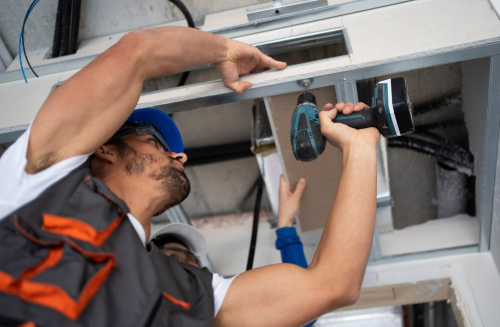Essential Tips for Professional HVAC Installation
- Staff Desk
- Apr 17
- 4 min read
Updated: Sep 19

Heating, Ventilation, and Air Conditioning (HVAC) systems play a crucial role in maintaining comfort in our homes and workplaces. However, the key to an efficient and long-lasting HVAC system lies in its installation. A professional HVAC installation not only ensures optimal performance but also enhances the system's lifespan. In this article, we will delve into essential tips for a successful HVAC system installation, helping you make informed decisions.
Understanding the Importance of Professional HVAC Installation

Before diving into the tips, it's important to understand why professional installation is crucial. An HVAC system is a significant investment, and improper installation can lead to inefficiencies, frequent repairs, and even complete system failure. Professional HVAC installation services ensure the system is set up correctly, adhering to industry standards and local regulations. If you're in Texas, choosing a trusted provider for ac installation Dallas residents rely on can make all the difference in long-term performance and energy savings.
Preventing Common Installation Mistakes
Improper installation can lead to frequent breakdowns and increased energy consumption. Common mistakes include incorrect sizing, poor ductwork design, and improper refrigerant levels. Professionals have the expertise to avoid these issues, ensuring your system operates efficiently from day one. Choosing a reputable services provider, such as GJ Appliances HVAC, can ensure that your installation adheres to industry standards and best practices. By relying on experienced professionals, you can extend the lifespan of your HVAC system and maintain its efficiency.
Compliance with Regulations
HVAC installations must comply with local building codes and safety regulations. Professionals specializing in HVAC installation are well-versed in these requirements, ensuring your system is installed legally and safely. This compliance not only protects you from legal issues but also ensures the safety of your home or office.
Optimizing Performance
A professionally installed HVAC system is more likely to perform at optimal levels. This means better airflow, consistent temperature control, and reduced noise levels. Professionals ensure all components are properly calibrated and aligned, leading to a more comfortable indoor environment.
Ensuring System Longevity
Proper installation is key to maximizing the lifespan of your HVAC system. Professionals use techniques that minimize wear and tear, ensuring components work harmoniously. This attention to detail can prevent premature system failure and costly replacements.
Selecting the Right HVAC System

Choosing the right HVAC system is the first step towards a successful installation. Here are some factors to consider:
System Size and Load Calculation
The size of your HVAC system should match your space requirements. An oversized system can lead to frequent cycling, while an undersized one may struggle to maintain comfort. A professional installer will conduct a load calculation to determine the correct size for your home or office. This involves assessing factors like square footage, ceiling height, insulation quality, and local climate.
Understanding Efficiency Ratings
Look for systems with high Seasonal Energy Efficiency Ratio (SEER) ratings. A higher SEER rating indicates better energy efficiency, which can lead to significant savings in the long run. Additionally, consider the Heating Seasonal Performance Factor (HSPF) for heat pumps and the Annual Fuel Utilization Efficiency (AFUE) for furnaces to gauge heating efficiency.
Types of HVAC Systems
Consider the type of system that best suits your needs—central air conditioners, heat pumps, or ductless mini-splits. Each has its pros and cons, and a professional can help you weigh these against your specific requirements. Central systems are ideal for whole-home solutions, while ductless systems offer flexibility for individual room control.
Evaluating Brand Reputation and Support
Not all HVAC systems are created equal. It's important to consider the reputation of the brand you choose. Look for brands that offer robust warranties and have a strong support network. Reading customer reviews and consulting with professionals can provide insights into reliability and customer satisfaction.
For HVAC professionals looking to streamline scheduling, job tracking, and customer management alongside installation tasks, investing in robust HVAC business software can greatly enhance operational efficiency and service quality. Tools built specifically for HVAC & mechanical companies help coordinate projects, keep detailed maintenance histories, and simplify invoicing—all of which support a smoother installation experience for both contractors and clients.
Considering Future Expansion
If you plan to expand your home or office in the future, consider how the HVAC system will accommodate growth. Some systems offer modular components that can be added on later, providing flexibility and cost savings. Planning for future needs can prevent the hassle and expense of replacing an undersized system.
Conclusion
Professional HVAC installation is a critical step in ensuring your heating and cooling system operates efficiently and lasts for years. By choosing the right system, preparing adequately, and following a thorough installation process, you can enjoy a comfortable indoor environment year-round. Remember, the key to a successful HVAC system installation lies in working with experienced professionals who can guide you through every step of the process.
Investing in professional HVAC installation services not only saves you money in the long run but also provides peace of mind, knowing your system is set up for optimal performance. Whether you're installing a new system or replacing an old one, these essential tips will help you make the best choices for your home or office. Prioritize professionalism and quality, and you'll reap the benefits of a well-functioning HVAC system for years to come.



Comments